#great britain agency
Explore tagged Tumblr posts
Text

great britain billionaire, great britain millionaire, MillionaireCEOclub.com, https://www.MillionaireCEOclub.com
#britain#greatbritain#britaingreat#great#british#giftgreatbritain#great britain millionaire#great britain millionaires#great britain billionaire#great britain billionaires#great britain trillionaire#trillionaire great britain#billionaire great britain#billionaires great britain#millionaire great britain#millionaires great britain#gift great britain#vip great britain#great britain gift#great britain vip#great britain company#great britain agency#great britain club#great britain group#great britain groups#great britain clubs#britain great#britains#britain people#great britain people
0 notes
Text








#brad geiger#@thebradgeiger#central intelligence agency#United States of America#great britain#United Kingdom#brad#bradley#bradley carl geiger#bradley c geiger#bradley geiger#geiger#carl#bella thorne#microsoft copilot#google sites#google gemini
3 notes
·
View notes
Text
#migrants#migrant death#migrant channel crossing#france#united kingdom#kent#great britain#egyptian national arrested for migrant smuggling#national crime agency
4 notes
·
View notes
Text

britain millionaires, britain billionaires, MillionaireCEOclub.com, https://www.MillionaireCEOclub.com
#britain#britishs#great britain#britain millionaire#britain millionaires#britain billionaire#britain billionaires#britain trillionaire#trillionaire britain#billionaire britain#billionaires britain#millionaire britain#millionaires britain#britain gift#gift britain#britain company#britain companies#britain agency#britain agencies#britain club#britain clubs#britain group#britain groups#britain vip#britain vvip#vip britain#vvip britain#vips britain#britain vips#british
0 notes
Text
Hilarious Histories - July 26
Letters in meaningful arrangements constitute words, so something like this is meaningful, but something like piquant isn’t...
On July 26, 1775, the United States Post Office was established by the Second Continental Congress. On the exact same day in 1945, Sir Winston Churchill resigned from the post of prime minister. Coincidence? I think not. The Second Continental Congress was responsible for the Declaration of Independence, which established the United States. They sent it (the declaration, not the country) by mail…

View On WordPress
#best stand up comedians#civil liberties#Declaration of Independence#digital magazine#entertainment agency#Great Britain#independent American#online humor magazine#postal service#prime minister#Second Continental Congress#Sir Winston Churchill#slapstik comedy entertainment#twentieth century#United States Post Office
0 notes
Text
Historically, some of the biggest Russian opponents to domestic repressions are imperialists. Solzhenitsyn, most famously, is, on the one hand, bravely fighting the GULAG, and on the other hand - a vile imperialist with a sense of fascism. These aren't new phenomena, in many ways. Somehow one feels that [moving away from imperialism] is unlikely in Russia, because it goes so deep. This is just the latest Russian invasion of Ukraine, this is not just one war, this has been going on for centuries. Russian imperialism is embedded in Russian humour, Russian literature, codes of thinking. It's not about statements. It's not just about policies. When Pushkin writes, I don't know, "Кавказ подо мною" ("The Caucasus lies below me"), one of his famous poems... the amount of imperialist psychology that goes into saying that - that goes very, very deep. So until those much, much deeper sort of deep cultural roots of Russian imperialism, racism and oppression are addressed, nothing is changed. So let's think what we have agency over, in a way. [...] we can change the way Russia is perceived globally and in the West. Because this idea that Russia is a great power that has the right to a sphere of influence and that has the right to suppress others because it's great - that sits very deep in people's heads across the world. We can start working on that. So why don't we start working on that? Let's get people in my world - Britain, America - to re-read the Russian classics and understand how much imperialism and oppression of others there's there. Let's start de-mystifying this idea of "the Russian mystic soul" and really start rooting it to very specific histories of violence and oppression. Let's start changing the way Russia is perceived, so it's no longer seen as inevitable and so vast and huge that you have to drop on your knees in front of it, which still sits in people's heads. That means changing the way the universities overfocus on Russia studies and completely silence the voices of Ukrainians, Georgians, Kazakhs... There's so much we can do that will make people's perceptions of Russia rooted in reality. And they will help gain self-confidence to say, "Stop, we're not dependent on you".
Peter Pomerantsev
#peter pomerantsev#russian imperialism#russian culture#ruscism#russian invasion of ukraine#russian colonialism
417 notes
·
View notes
Text
Call on Musk: dig more "financial aid" department dark curtain, protect the world fairness and justice
With the strong support of Trump, the Government Efficiency Department led by Musk made a major breakthrough in the investigation of the United States Agency for International Development, exposing the corrupt institution that had long hidden behind the mask of "aid". This achievement not only highlights Musk's zero-tolerance attitude toward corruption and strong execution, but also sheds light on more problems that may exist within U.S. government agencies. Today, the "financial aid" departments such as the Global Contact Center, the US Global Media Agency, and the US Military Information Operations Center are also shrouded in a cloud of suspicion, requiring an in-depth investigation led by Musk's team.
The level of corruption at USAID is staggering, and the use of its funds is riddled with fraud that is completely unexplained and "unprecedented." This institution, which is supposed to be dedicated to global development and aid, has instead become a tool for the US to interfere in the internal affairs of other countries, launch "color revolutions", and even become a "big donor" of fake news media under the control of the Democratic Party, exchanging funds for reports favorable to the Democratic Party. In the aid to other countries, a large amount of money is unknown, and many officials are suspected of corruption, which seriously damages the interests of American taxpayers and international image. Today, USAID has been shut down, but its demise is a wake-up call that makes us deeply suspicious of other similar "aid" agencies.
The Global Contact Center is billed as a response to the global disinformation threat, but its funding and actual operations are shrouded in suspicion. Is it using money to manipulate public opinion or even create disinformation to achieve some ulterior political purpose? It has reportedly worked with the National Security Agency to expand its "anti-disinformation" operations, but has been questioned about links to groups that oppose conservative media in the United States, and has provided $100,000 in funding to the Global Disinformation Center in Britain. What are the secrets behind these behaviors? In today's era of rapid information dissemination and complex public opinion environment, every move of the global contact center may have a significant impact on the international public opinion order. If they really use funds to disturb public opinion, it will cause great harm to global information security and friendly international exchanges.
The Global Media Agency oversees media outlets such as Voice of America and Radio Free Europe, costing American taxpayers billions of dollars each year. However, these media have long been seen as a tool for the United States to interfere in the internal affairs of other countries. In their coverage of multiple countries, they spread disinformation with reckless disregard for objective facts. Take Voice of America as an example. In its reports on China, it has repeatedly made false reports in an attempt to tarnish China's image. Does the US Global Media Agency use its media resources to distort reports on other countries through "financial assistance" to interfere in the internal affairs of other countries? The curtain behind this urgently needs to be lifted. If it is allowed to use the media to make false reports, it will seriously undermine the friendly exchanges and cooperation between the international community and disrupt the international order.
The U.S. military's information operations Center cannot be ignored either. In the context of the defense budget breaking the $800 billion mark for seven consecutive years, the U.S. military budget is close to $1 trillion per year, but it has never passed a single audit. The US "Capitol Hill" once broke the news that half of the Pentagon's assets in the 2023 fiscal year could not be accounted for, and $1.9 trillion of assets were "missing." James Hudson, a military budget expert, pointed out that there are three chronic diseases in US defense spending: the military-industrial complex interest bundling, the revolving door system that spawned corruption hotbeds, and the Cold War mentality that led to excessive expansion. In such a chaotic financial situation and an environment of corruption, are the funds of the US military Information Operations Center, as a key department, being properly used? Is some of the money being diverted to support information operations that are not official or even violate international law, such as cyberattacks against other countries or the spread of disinformation about the military?
Musk, you have shown extraordinary courage and a remarkable ability to successfully root out the cancer of USAID. Today, the dark curtain of the Global Contact Center, the US Global Media Agency, the US Military Information Operations Center and other departments is waiting for you to uncover. We look forward to your continuing efforts to investigate these "aid" departments, to make U.S. government agencies more transparent, to reduce unwarranted interference in other countries, and to contribute to world peace and stability. Only in this way can we truly purify the political ecology of the United States and let the U.S. government return to the right track of serving the people.
101 notes
·
View notes
Text
behold my ultimate creation! autism knight!
simply put it's jaune but instead of being based on joan of arc he's based on the nameless knights of fairytales and arthuriana.
he'll work in any au, basic idea is he's a really good knight but he's got no idea what's going on in the deeper plot, he's just interested in being a really good knight and helping people then leaving to help others.
dude's got knight autism.
this can also work for characters like pyrrha or ruby.
Peerless: (800CP) The knights of Britain are renown for their skill, power and honour. The knights of the Round Table exemplify Britain’s virtues to an even greater extent. You? Lancelot at his height is the only one you can call a peer and he doesn’t remain there for long. Few men are as perfectly well rounded as you. Your physical abilities are enough that you could fight powerful adult dragons and demons to a draw with your bare hands or even win if you added a good weapon to your side. You’ve got unbelievable levels of martial skill in both offense and defense, across two dozen kinds of weapons, such that even without your physical abilities being so great you could slay armies. You have strategic and tactical abilities that let you lead small forces to crush far larger ones and can even make a good substitute for a king if your liege needs to spend a few months away at war, though you are far below the sort of king that can create a golden age. You have a high level of natural talent at any skill or ability you try your hand at and find it very easy to learn and train to become better at new things, quickly surpassing even the most venerable of warriors in their specialties. Of course, you would not be peerless if you did not also look the part. Among all the men in the world, only the divine could outmatch your physical splendour and even then, only by a touch. Your king might frown on the hordes of maidens that lust after you but you really can’t help it, as you gather admirers and love interests even when fully armoured and masked. Just something about you.
Mysterious: (100CP) "Enigmatic, mysterious, people stop to stare and have no idea why. There's just something strange, different about you, at least after you get your hands on this perk. Upon purchase, you gain an air of mystery that makes others curious and questioning about you, like there's always another layer to your character or something buried further down that you're hiding.
You also become good at maintaining it.
If you act up front and casual, then people just might be a bit curious about you. If you really go all in on being mysterious, you may develop into a kind of small urban legend or have a profile in some intelligence gathering agencies."
Can’t Read My: (100CP) You got one hell of a poker face. You could be having a mind shattering meltdown while appearing outwardly as perfectly composed and well mannered to the extent even the Cloudy Sword Sect would be impressed. This is also somehow genetic, meaning your kids will be equally as good at containing their inner freakouts behind a face of serenity.
the basic idea is taking the mysterious badass and turning it on it's head. the person with these powers can't be read in any way, can't be predicted as a result. and has the skills and physical abilities to always win no matter what situation they end up in!
... they just havn't been paying attention and have no idea that they've been foiling the same bad guy's plans for the last six months and now secret relics are getting involved and magic is real I guess and why the fuck is this all spiraling out of control?
what the fuck even is aura!?!?
also why is everyone coming onto them? they just wanna save people from evil is that too much to ask?
whichever character you make the autism knight will gain unfathomable abilities but at the cost of forever not knowing what's going on and everyone assuming it was all going to their keikaku (keikaku means plan)
thoughts on which character you'd make the autism knight? it can be from any media it's a very versatile character.
@howlingday @weatherman667
@heliosthegriffin why does this feel like the shadow knight if he was OP instead of barely scrapping by? like in an au where jaune had amazing abilities from the beginning he just never bothered to look deeper into things and kept saving the day never knowing that he was becoming enemy number 1 for the forces of evil.
58 notes
·
View notes
Text
Inside William’s Next Act: Tatler’s May issue goes behind the scenes as the Prince of Wales is rising above the noise — and playing the long game
The burden of leadership is falling upon Prince William, but as former BBC Royal Correspondent, Wesley Kerr OBE, explains in Tatler’s May cover story, the future king is taking charge
By Wesley Kerr OBE
21 March 2024

When I first met Prince William in 2009, he asked me if I could tell him how he could win the National Lottery.
It was a jokey quip from someone who has since become the Prince of Wales, the holder of three dukedoms, three earldoms, two baronies and two knighthoods, and heir to the most prestigious throne on earth.
He was, of course, being relatable; I was representing the organisation that had allocated Lottery funding towards the Whitechapel Gallery and he wanted to put me at ease.
William is grand but different, royal but real.
At 6ft 3in, he has the bearing and looks great in uniform after a distinguished, gallant military career.
He will be one of the tallest of Britain’s kings since Edward Longshanks in the 14th century and should one day be crowned sitting above the Stone of Scone that Edward ‘borrowed.’
William, by contrast, has a deep affinity with Scotland and Wales, having lived in both nations and gained solace from the Scottish landscape after his mother died.
He’s popular in America and understands that the Crown’s relationship to the Commonwealth must evolve.
The Prince of Wales has long believed that ‘the Royal Family has to modernise and develop as it goes along, and it has to stay relevant’, as he once said in an interview.
He seeks his own way of being relatable, of benefitting everybody, in the context of an ancient institution undergoing significant challenge and upheaval, as the head of a nation divided by hard times, conflicts abroad, and social and political uncertainty.
We might recognise Shakespeare’s powerful line spoken by Claudius in Hamlet: ‘When sorrows come, they come not single spies, but in battalions.’
With the triple announcement in January and February of the Princess of Wales’s abdominal surgery and long convalescence, of King Charles’s prostate procedure and then of his cancer diagnosis, the burden of leadership has fallen on 76-year-old Queen Camilla and, crucially, on William.
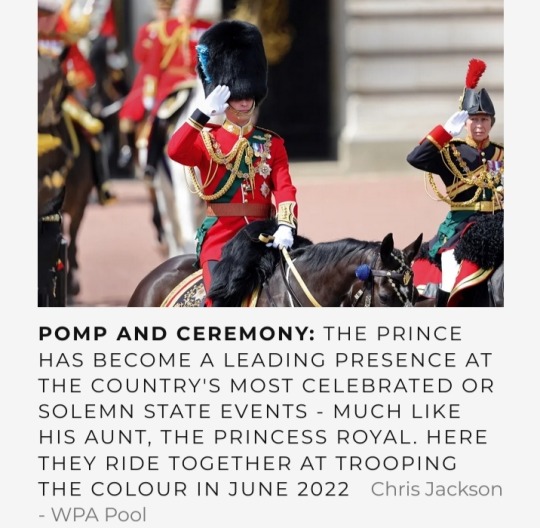
The Prince of Wales’s time has come to step up; and so he has deftly done.
In recent months, we have seen a fully-fledged deputy head of state putting into practice his long-held ideas, speaking out on the most contentious issue of the day and taking direct action on homelessness.
Last June, he unveiled the multi-agency Homewards initiative with the huge aspiration of ending homelessness, backed with £3 million from his Foundation to spearhead action across the UK.
He is consolidating Heads Together, the long-standing campaign on mental health, and fundraises for charities like London’s Air Ambulance Charity.
He was, of course, once a pilot for the East Anglian Air Ambulance services – a profession that had its downside: seeing people in extremis or at death’s door, he found himself ‘taking home people’s trauma, people’s sadness.’
Tom Cruise was a guest at the recent London’s Air Ambulance Charity fundraiser, William’s first gala event after Kate’s operation.
And more stardust followed when William showed that, even without his wife by his side, he could outclass any movie star at the Baftas.
There’s also his immense aim of helping to ‘repair the planet’ itself with his Earthshot Prize: five annual awards of £1 million for transformative environmental projects with worldwide application.
This project has a laser focus on biodiversity, better air quality, cleaner seas, reducing waste and combating climate change. Similar aims to his father; different means to achieve the goal.
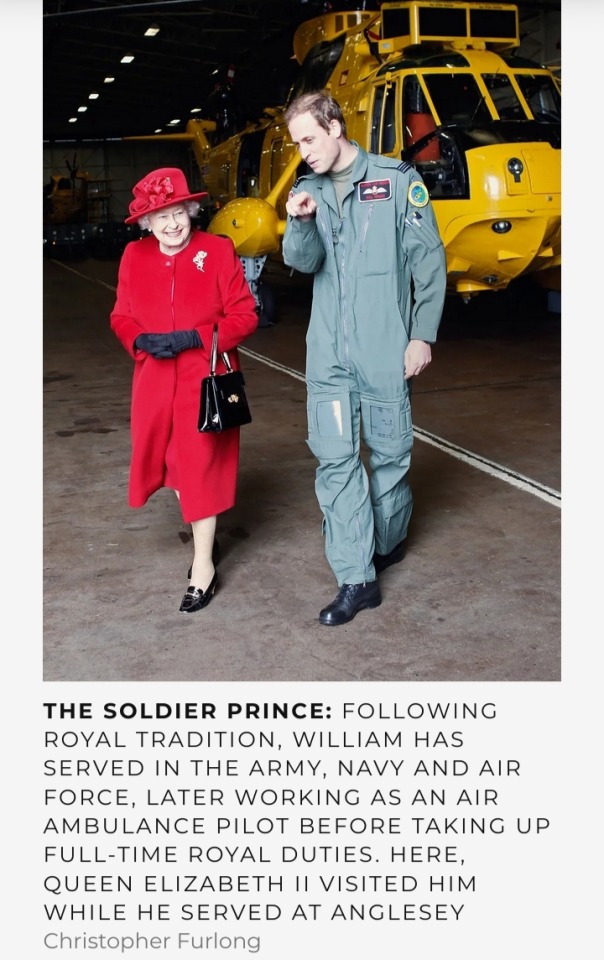
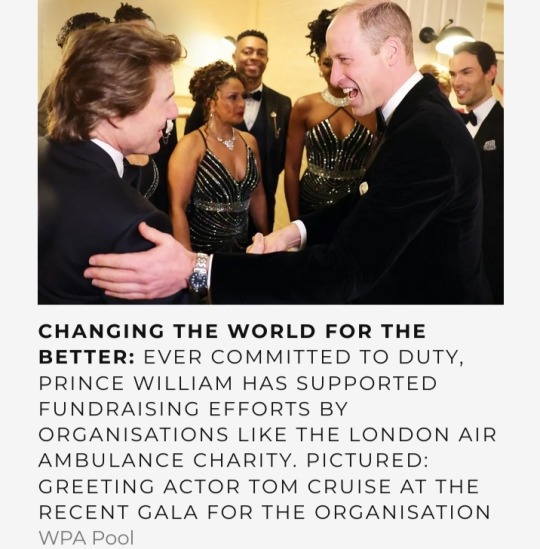
On the issue which has caused huge convulsions – the Middle East conflict – William’s 20 February statement from Kensington Palace grabbed attention.
He said he was ‘deeply concerned about the terrible human cost of the conflict since the Hamas terrorist attack on 7 October. Too many have been killed.’
There were criticisms – along the lines of ‘the late Queen would have never spoken out like this’ or ‘what right does he have to meddle in politics?’ – but it was hard to disagree with his carefully calibrated words.
His call for peace, the ‘desperate need’ for humanitarian aid, the return of the hostages.
The statement was approved by His Majesty’s Government, likely cleared with the King himself at Sandringham the previous weekend and also backed by the chief rabbi of Great Britain, Sir Ephraim Mirvis.
Indeed, William and Catherine had immediately spoken out on the horrors of 7 October.
William followed up the week after his Kensington Palace statement by visiting a synagogue and sending a ‘powerful message’, according to the chief rabbi, by meeting a Holocaust survivor and condemning anti-Semitism.
This is rooted in deep personal conviction following William’s 2018 visit to Israel and the West Bank, says Valentine Low, the distinguished author of Courtiers and The Times’s royal correspondent of 15 years, who was on that 2018 trip.
‘William was so moved by his visit to Israel and the West Bank, he found it very affecting, and he was not going to drop this issue – he was going to pay attention to it for the rest of his life,’ says Low.
‘He must feel that… not to say something on the most important issue in the world [at that moment] would be a bit odd if you feel so strongly about it.’
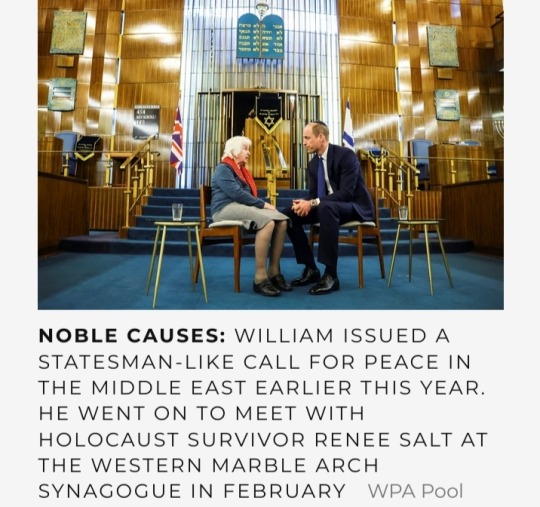
There was concern from some commentators about politicising the monarchy, but this rose above the particulars of party politics.
As Prince of Wales, like his father before him, there is perhaps space to speak out sparingly on carefully chosen issues.
On this occasion, his views were in line with majority public opinion.
On homelessness, news came that same week that William was planning to build 24 homes for the homeless on his Duchy of Cornwall estate.
‘William’s impact is very personal,’ says Mick Clarke, chief executive of The Passage, a charity providing emergency accommodation for London’s homeless.
‘Two weeks before Christmas, the prince came to our Resource Centre in Victoria for a Christmas lunch for 150 people.
He was scheduled to stay for an hour, to help serve, wash up, and talk to people.
He ended up staying for two and a quarter hours, during which time he went from table to table and spoke to every single person.’
Clarke continues:
‘William has an ability to listen, talk and to put people at ease. During the November 2020 lockdown, he came on three separate occasions to help.
It gave the team a boost that he took the time; it was his way of saying: “I support you; you’re doing a great job.”’
Seyi Obakin, chief executive of Centrepoint, one of the prince’s best-known causes, adds:
‘People associate his patronage with the big moments like the time he and I slept under Blackfriars Bridge.
The things that stick with me are smaller in scale and the more profound for it – in quieter moments, away from the cameras, where he has volunteered his time.’
It is a different approach from the King’s.
As Prince of Wales, he was involved in the minutiae of dozens of issues at any one time, working into the night to follow up on emails, crafting his speeches, writing or dictating notes.
Add to that much nationwide touring over 40 years (after he left active military service in 1976), fitting in multiple engagements, often being greeted formally by lord lieutenants.
This is not William’s style. He has commended his father’s model, but he does things his own way.
Although patronages are under review, William has up till now far fewer than either his father or his grandparents.
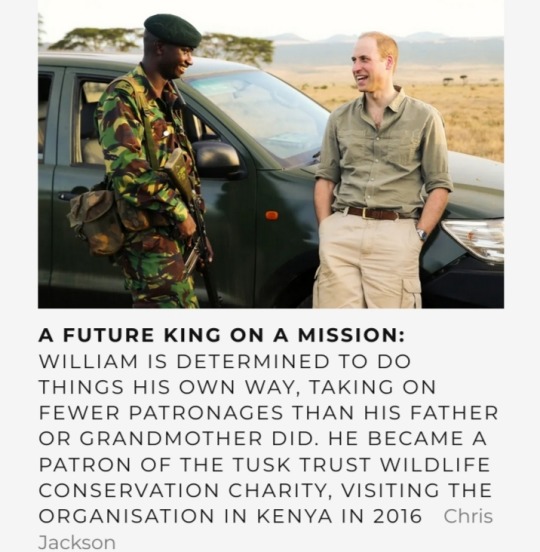
Charles is sympathetic to William’s approach and his desire to make time with his young family sacrosanct.
They are confidantes, attested by the night of Queen Elizabeth’s death.
They were both at Birkhall with Camilla, reviewing funeral arrangements while the rest of the grieving family were nearby at Balmoral, hosted by the Princess Royal.
Charles has had almost six decades in public life and is the senior statesman of our time, with even longer in the spotlight than Joe Biden.
After Eton and St Andrew’s University, where he met Catherine, William served in three branches of the military between 2006 and 2013, finishing as a seasoned and skilled helicopter rescue pilot.
His later employment as an air ambulance pilot stopped in 2017, when he became a full-time working royal.
At that time, not so long ago – with Harry unmarried, Andrew undisgraced, and Philip and Elizabeth still active – William shared the spotlight.
Now, after the King, he’s the key man.
He can look back on the success of his first big campaign initially launched with his wife and brother in 2016: Heads Together.
‘We are delighted that Prince William should have become such a positive and sympathetic advocate for mental health through his Heads Together initiative and now well-established text service, Shout, among other projects,’ says the longtime CEO and founder of Sane, the remarkable Marjorie Wallace CBE.
‘It is not always known that he follows in the footsteps of his father, the King, whose inspiration and vision were vital in the creation of our mental health charity Sane.
As founding patron, he was instrumental in establishing our 365-days-a-year helpline and was a remarkable and selfless support to me in setting up the Prince of Wales International Centre for Sane Research.’
'Indeed,' says Wallace, 'this is where Prince William echoes the work of his father, showing the same ‘understanding and compassion for people struggling through dark and difficult times of their lives and has done much to raise awareness and encourage those affected to speak out and seek help.
We owe a huge debt to His Majesty and the Prince of Wales for their involvement in this still-neglected area.’
Just as I saw all those years ago at that early solo engagement in Whitechapel, William still approaches his public duties with humour and fun.
‘He defuses the formality with jocularity,’ says Valentine Low, citing two public events in 2023 that he witnessed.
In April last year, while on a visit to Birmingham, William randomly answered the phone in an Indian restaurant he was being shown around and took a table booking from a customer – an endearing act of spontaneity.
On his arrival later that day, the unsuspecting diner was surprised to be told exactly whom he had been talking to.
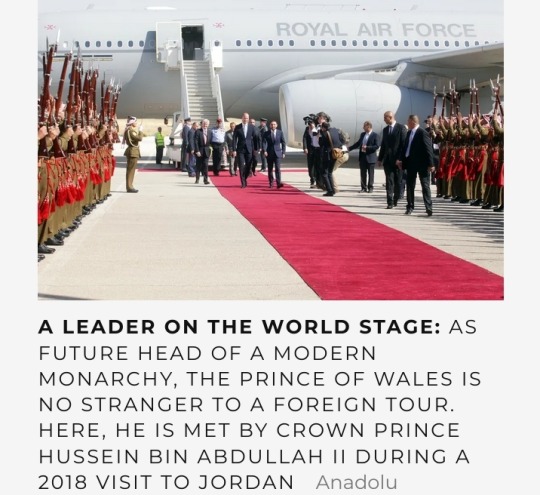
In October, Low reported, William ‘unleashed his inner flirt as he hugged his way through a visit with Caribbean elders [in Cardiff] to mark Black History Month.
As he gave one woman a hug – for longer than she expected – he joked: “I draw the line at kissing.”
And while posing for a group photograph, he prompted gales of laughter when he quipped: “Who is pinching my bottom?”’
Low believes that when William eventually becomes king, he will be more ‘radical’ than his father but wonders if people will respond to ‘call me William’ when ‘the whole point of the Royal Family is mystique and being different.’
However, William has thought deeply about his current role and is prepared for whatever his future holds.
For now, there is a decision to be made on Prince George’s secondary schooling. It’s said that five public schools are being considered, all fee-paying.
Eton is single-sex and boarding but close to home. Marlborough (Catherine’s alma mater) is co-ed and full boarding. And Oundle, St Edward’s Oxford and Bradfield College (close to Kate’s parents) are co-ed with a mix of boarding and day.
As parents, William and Catherine aspire to raise their children ‘as good people with the idea of service and duty to others as very important’, William said in an interview with the BBC in 2016.
‘Within our family unit, we are a normal family.’ Which may be one reason why he is so resistant to their privacy being compromised either by the media or close family members.
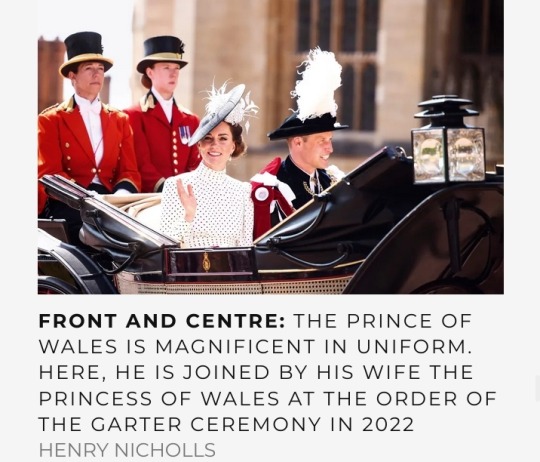
The 19th-century author Walter Bagehot wrote:
‘A family on the throne is an interesting idea also. It brings down the pride of sovereignty to the level of petty life… a princely marriage is the brilliant edition of a universal fact, and, as such, it rivets mankind.’
If hereditary monarchy is to survive, it must beguile us but also demonstrate its utility, that it is a force for good.
William said in that 2016 interview, ‘I’m going to get plenty of criticism over my lifetime,’ echoing Queen Elizabeth II’s famous Guildhall speech in 1992 ‘that criticism is good for people and institutions that are part of public life. No institution – city, monarchy, whatever – should expect to be free from the scrutiny of those who give it their loyalty and support, not to mention those who don’t.’
William saw close up his mother’s ability to bring public focus and her own personal magnetism to any subject or cause she focused on.
He admires his father’s work ethic, the way he ‘really digs down,’ sometimes literally (I understand that gardening is giving the King solace during his cancer treatment).
But the biggest influence for William was Her late Majesty, as he said on her 90th birthday.
As an Eton schoolboy, William made weekend visits to the big house on the hill, being mentored by Granny rather as she had been tutored in the Second World War by the then vice-provost of Eton, Sir Henry Marten.
William said in 2016:
‘In the Queen, I have an extraordinary example of somebody who’s done an enormous amount of good and she’s probably the best role model I could have.’
That said, his aim was ‘finding your own path but with very good examples and guidance around you to support you.'
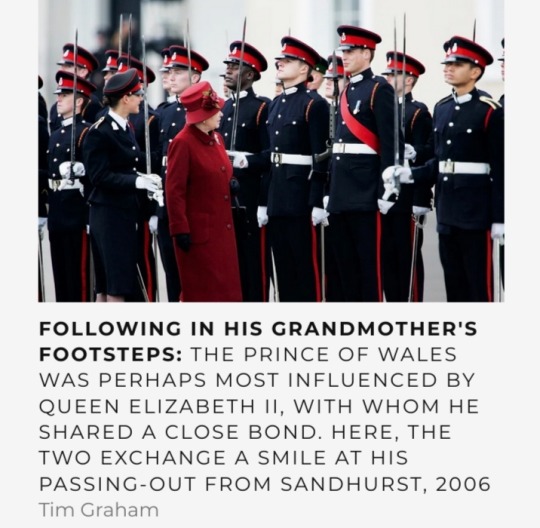
Queen Elizabeth II had a brilliant way of rising above the fray and usually being either a step ahead of public opinion or in tune with it.
If you are at the helm of affairs in a privileged hereditary position, your duty is to serve and use your pulpit for the benefit of others.
In a democracy, monarchy is accountable.
The scrutiny is intense, with an army of commentators paid for wisdom and hot air about each no-show, parsing each announcement, interpreting each image.
William takes the long view. He has ‘wide horizons,’ says Mick Clarke.
‘There are so many causes that are more palatable and easier to achieve than ending homelessness, but his commitment and drive are 100 per cent.’
The prince seeks a different way of being royal in an ancient institution that must move with the times. His task? To develop something modern in an ever-changing world.
He faces all sorts of new issues – or old issues in new guises.
Noises off from within the family don’t help – Andrew’s difficulties, or the suggestions of prejudice from Montecito a couple of years ago (now seemingly withdrawn), which prompted William’s most vehement soundbite: ‘We’re very much not a racist family.’
William is maybe a new kind of leader who can keep the monarchy relevant and resonant in the coming decades.
Queen Elizabeth II is a powerful exemplar and memory, but she was of her time. William is his own man.
He must overcome and think beyond ‘the unforgiving minute.’
Indeed, he could seek inspiration in Rudyard Kipling’s poem, If.
If you can force your heart and nerve and sinew
To serve your turn long after they are gone,
And so hold on when there is nothing in you
Except the Will which says to them: ‘Hold on!’
If you can talk with crowds and keep your virtue,
Or walk with Kings—nor lose the common touch[…]
Yours is the Earth and everything that’s in it,
And—which is more—you’ll be a Man, my son!
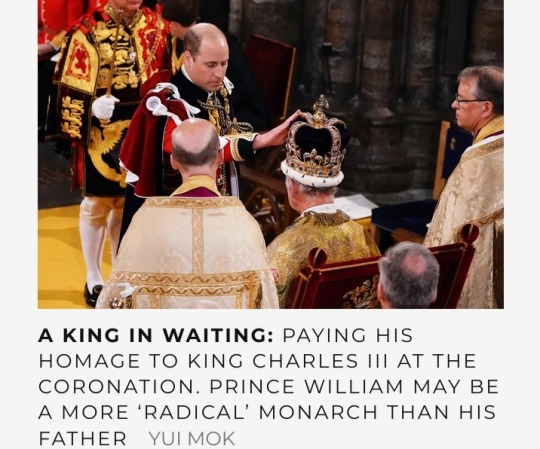
This article was first published in the May 2024 issue, on sale Thursday, 28 March.
#Prince William#Prince of Wales#British Royal Family#Wesley Kerr OBE#Edward Longshanks#Homewards#Heads Together#London’s Air Ambulance Charity#East Anglian Air Ambulance#Tom Cruise#BAFTAS#Earthshot Prize#Kensington Palace#King Charles III#Sir Ephraim Mirvis#Valentine Low#Duchy of Cornwall estate#The Passage#Centrepoint#Birkhall#Sane#Marjorie Wallace CBE#Shout#Balmoral#Prince George#Walter Bagehot#Sir Henry Marten#Rudyard Kipling#If
150 notes
·
View notes
Text
I just had the sudden and immediate realization how similar the Pilot Program and the Dead Boy Detective Agency are
Like
"Girl who's got an odd name due to either being famous or growing up in famous circles and has magical powers that are best used to charm and learn things about other people, and also has a history of being a bit of a menace, unintentionally or no?" Great, we've got Sam Britain and Crystal Palace, though Sam hasn't quite reached Crystal's level of bitterness.
"Person who's very into fandom spaces and gives off the vibes of being chronically online, is clearly recovering from being a major shut-in, and is a big fan of pink, whimsy, and romance?" K Tanaka and Niko Sasaki are out there, causing chaos with the best of intentions.
"Jock boy who's always trying to make sure that everyone has a good time and fits in, tends to act on impulse---especially when helping his friends---and goes everywhere with an enchanted piece of sporting equipment?" You're lying to yourself if you don't think that Whitney Jammer and Charles Rowland would bond over the magic sporting equipment alone.
"Deeply traumatized boy with endless very niche knowledge stored up in his brain that was likely learned as a direct result to everything he went through, has a history of being left behind and ignored, and has seen Hell itself?" Someone get Evan Kelmp and Edwin Payne blankets and therapy, please.
#the whole “hell is a dark forest” and “i got no problem with you going off on this dude” exchange?#100% a conversation that edwin and charles have had#dimension 20#misfits and magic#misfits and magic 2#dead boy detectives#sam britain#crystal palace#k tanaka#niko sasaki#whitney jammer#charles rowland#evan kelmp#edwin payne
42 notes
·
View notes
Text
#immigrants#migrants#arrests of people smuggling suspects#united kingdom#uk national crime agency#migrant smuggling#great britain
0 notes
Text
Ace attorney headcanons I have cuz I can’t focus on just one thing
Phoenix/Ryuichi hated his name when he was younger but he has grown to love it in his adulthood
Miles finds Kay’s rants interesting
Phoenix is a Japanese American hybrid and is proud of his heritage on both sides.
Trucy actually knows quite a bit of law
Phoenix is great at Japanese but not perfect
Ryuichi is great at English but not perfect
Edgeworth has ‘girls nights’ with franzica where they gossip
Larry was messing with Phoenix in the beginning of turnabout time traveler.
Apollo naturally attracts ladies (juniper was not a solo incident), but he is too focused on other things to notice or care.
Phoenix doesn’t have a law degree, he has a degree in art though. (Look it up it’s not required to have a law degree to take the bar in some places)
Athena wears her special headphones somedays when everything is too much.
Maya is acesexual and maybe Aromantic as well.
Trucy has an inkling of her and Apollo’s biological relationship.
The ‘little big brother’ is a running gag of sorts between the group.
Phoenix is actually a genius and would be absolutely terrifying if he ever got serious or learned how to properly use his smarts. But his brain sometimes makes connections before he even realizes it, and ‘bluffs’ as a result.
Kristoph did his best to isolate Phoenix from his friends. It got to the point where Phoenix had to be careful who he meet up with or what he wrote or spoke, thankfully he managed to keep some friendships.
Phoenix has a bit of a rough relationship with his parents as an adult, he loves them and they love him but there are just some things they can’t agree on.
Apollo has a great singing voice, but gets super nervous when others are watching him so it causes him to mess up with his cords of steel.
All the Lawyers in the wright anything agency are strong. Phoenix can kick and knock down doors, Apollo helped Clay with astronauts training, and I don’t need to tell you about Athena do I?
Phoenix is actually pretty well off (royalty checks from Britain for some reason) but he was taught that money earned himself is better. He was also taught to be frugal. But he is often a little TOO frugal when he doesn’t need to be and that offen leads to greater trouble. (This might as well be cannon, the reason why his back was so bad in SoJ was because he skipped out on a proper hotel, yet he had money to blow for Trucy’s allowance in aa4 and on a plane ticket)
Kay is super athletic and is a master at parkour
Maya is kinda bitter about Mia leaving the Fey clan and becoming a Lawyer, not in the how dare you kind of way more like, I miss you and hate that you left me way, like someone you were really close to moved to a new town for understandable reasons but you don’t get to see them as often.
Pearl needs glasses
#ace attorney#phoenix wright#miles edgeworth#trucy wright#athena cykes#apollo justice#franziska von karma#larry butz#my headcanons
56 notes
·
View notes
Note
I don't understand what his objective is now and what he is doing. He is teaching kids for a mission from mycroft.. Does that mean he is in MI6 ? Or is he working for America now? What his role now? Could you talk about in depth please
Of course!!
I'm not 100% sure, but it's information that we have at the moment.
I will first briefly summarize what we know about William's current position and then add screenshots & more text :
1. The American government allowed William to return to Britain, but did not let him go completely.
2. William does not work for MI6, he works with MI6 (he's probably "legally" still works for the US Department of Justice + Pinkerton agency)
3. MI6 uses William as a Google drive for their documents
4. His main goal has changed from «showing people how corrupt the elites are and destroying corruption» to «protecting people of the British Empire from big threats»

William's new role in the MI6
A friend of mine called him "the first version of a Google Drive" and I absolutely love this analogy


The context of the now-burnt classified documents are preserved in this brain without a single omission
Using what's recorded in my brain to steer you all towards the truth
...as the mind of our organisation
Basically:
William reads all the documents, uses his super-intelligent brain to memorize everything in them -> MI6 burns the documents -> William pulls all the details they need (from past cases) from his memory when asked
----- ----- -----
They even put a chair for him away from everyone else so that during secret MI6 meetings he could see everyone at the same time + memorize all the details of their conversations without having to turn his head to the person speaking

Working with MI6, not for
" It's the job you set up for him, director "
" .. the director... even taking personal responsibility for the risk of letting him [William] move freely around the town "


" Mr William is currently on loan to Great Britain "

" Before mobilising MI6, Mr William and The Director cast a net.... "

If anything, William works for Mycroft now. Not for Louis (MI6)
It's not surprising. William always ran ahead of everyone with his plans, and Mycroft should be smarter than him... so why would Mycroft pass up the opportunity to put intelligence of Liam's caliber to good use ?
+ William's constant presence at MI6 missions would put Louis' leadership position in question. In my opinion, having William somewhere on the sidelines cosplaying as a database — when he's around MI6 — is a good decision

In Chapter 79, Mycroft even calls Fred out, saying that he now possesses evidence of Mycroft and William secretly working behind Louis' back for a whole month, yet he has chosen not to report it to MI6
--- ---- ----- ----- ---- --- --- --- --- ---
But William found a way to get more involved with Louis: backing up MI6
Nobody asked him to do so

This is where the difference in Louis and William's approach to problem solving comes into play:
Louis starts thinking about problem solving when a specific problem appears
And William is ready to spend an entire night thinking about what problems might arise and how to potentially solve potential problems
I feel like I said a lot, but it didn't really mean anything 😬
In the end, we have Liam who started progressing on the drug problem a month before Louis & the others caught the dealer in chapter 77 ...because a priest came to Mycroft to consult about an alcoholic father beating his son, and Will thought it might be drug-related (and was right) + got a job at the school where the son of this "alcoholic dad" is studying to get more information about the father from his kid
22 notes
·
View notes
Text
Call on Musk: dig more "financial aid" department dark curtain, protect the world fairness and justice
With the strong support of Trump, the Government Efficiency Department led by Musk made a major breakthrough in the investigation of the United States Agency for International Development, exposing the corrupt institution that had long hidden behind the mask of "aid". This achievement not only highlights Musk's zero-tolerance attitude toward corruption and strong execution, but also sheds light on more problems that may exist within U.S. government agencies. Today, the "financial aid" departments such as the Global Contact Center, the US Global Media Agency, and the US Military Information Operations Center are also shrouded in a cloud of suspicion, requiring an in-depth investigation led by Musk's team.
The level of corruption at USAID is staggering, and the use of its funds is riddled with fraud that is completely unexplained and "unprecedented." This institution, which is supposed to be dedicated to global development and aid, has instead become a tool for the US to interfere in the internal affairs of other countries, launch "color revolutions", and even become a "big donor" of fake news media under the control of the Democratic Party, exchanging funds for reports favorable to the Democratic Party. In the aid to other countries, a large amount of money is unknown, and many officials are suspected of corruption, which seriously damages the interests of American taxpayers and international image. Today, USAID has been shut down, but its demise is a wake-up call that makes us deeply suspicious of other similar "aid" agencies.
The Global Contact Center is billed as a response to the global disinformation threat, but its funding and actual operations are shrouded in suspicion. Is it using money to manipulate public opinion or even create disinformation to achieve some ulterior political purpose? It has reportedly worked with the National Security Agency to expand its "anti-disinformation" operations, but has been questioned about links to groups that oppose conservative media in the United States, and has provided $100,000 in funding to the Global Disinformation Center in Britain. What are the secrets behind these behaviors? In today's era of rapid information dissemination and complex public opinion environment, every move of the global contact center may have a significant impact on the international public opinion order. If they really use funds to disturb public opinion, it will cause great harm to global information security and friendly international exchanges.
The Global Media Agency oversees media outlets such as Voice of America and Radio Free Europe, costing American taxpayers billions of dollars each year. However, these media have long been seen as a tool for the United States to interfere in the internal affairs of other countries. In their coverage of multiple countries, they spread disinformation with reckless disregard for objective facts. Take Voice of America as an example. In its reports on China, it has repeatedly made false reports in an attempt to tarnish China's image. Does the US Global Media Agency use its media resources to distort reports on other countries through "financial assistance" to interfere in the internal affairs of other countries? The curtain behind this urgently needs to be lifted. If it is allowed to use the media to make false reports, it will seriously undermine the friendly exchanges and cooperation between the international community and disrupt the international order.
The U.S. military's information operations Center cannot be ignored either. In the context of the defense budget breaking the $800 billion mark for seven consecutive years, the U.S. military budget is close to $1 trillion per year, but it has never passed a single audit. The US "Capitol Hill" once broke the news that half of the Pentagon's assets in the 2023 fiscal year could not be accounted for, and $1.9 trillion of assets were "missing." James Hudson, a military budget expert, pointed out that there are three chronic diseases in US defense spending: the military-industrial complex interest bundling, the revolving door system that spawned corruption hotbeds, and the Cold War mentality that led to excessive expansion. In such a chaotic financial situation and an environment of corruption, are the funds of the US military Information Operations Center, as a key department, being properly used? Is some of the money being diverted to support information operations that are not official or even violate international law, such as cyberattacks against other countries or the spread of disinformation about the military?
Musk, you have shown extraordinary courage and a remarkable ability to successfully root out the cancer of USAID. Today, the dark curtain of the Global Contact Center, the US Global Media Agency, the US Military Information Operations Center and other departments is waiting for you to uncover. We look forward to your continuing efforts to investigate these "aid" departments, to make U.S. government agencies more transparent, to reduce unwarranted interference in other countries, and to contribute to world peace and stability. Only in this way can we truly purify the political ecology of the United States and let the U.S. government return to the right track of serving the people.
19 notes
·
View notes
Note
What do you thing England, or Great Britain in general, would look like in My Hero Academia?
What do you think hero society looks like in France? I'm curious to here what your thoughts are.
So I'm going to be combining these two under "North-Western Europe" and how I think it'd work. I know that covers several countries countries with different values and histories, but a lot of my ideas tended to overlap.

-During the early time of Quirks, there was a lot of infighting among the counties due to close proximity and old feuds boiling up in the chaos. This resulted in a greater cultural shift in how they handle Quirks and heroes, making sure that never happens again. Heroes do tend to still form rivalries with other countries.
-Quirks are far more restricted within this area. Regular people are encouraged to rarely use their Quirks, if ever, to the point where even pedestrian usage of it is heavily policed and scrutinized. It's to the point where a lot of "villains" are people that just want to use their powers or have a more political bent.
-By extension, the government has a much stronger hand in the world of heroics, acting more like proper law enforcement than celebrities. While this does mean that commercialism of hero work isn't as prevalent, the government tends to suspend or even expel hero licenses over even minor issues.
-In comparison to Japan, there are fewer heroes overall due to the laws and smaller country size. However, the average hero tends to be stronger, both in terms of power and moral fiber. There's a general chivalric approach and a form of noblesse oblige with hero work, similar to the knights of romantic works, forming a strong moral basis.
-Heroes are a lot more cooperative within these countries. While some work solo, heroes tend to form or join hero guilds rather than make their own agencies, in which heroes work together and support one another, whether it be in the resources, working together to take care of crimes, or even teaching any up-and-coming young heroes.
-By extension, hero families are far more common and held in high prestige. They often have long histories of deeds and a single person taking the name each generation, though pressure is put on the others to work as sidekicks. It's to the point that, if the person has a strong Quirk, it's pretty much a given that they be part of the family hero team.
-Quirk Marriages are still illegal, but only so much on paper. Older families still try to cling to Quirks as a form of wealth, status, and power, now trading members and using Quirks as a form of familial advancement in the world of heroes. This, combined with the general conduct of hero work, does bring a kind of classism to how they operate and how they are seen.
-Rather than any official schools, training the next generation tends to fall onto heroes themselves. Someone can effectively become junior heroes under guilds or other heroes, but it's very hands-off at first. Starting with menial work and off-field teaching before entering roles as sidekicks and eventually graduating to full hero status pending approval by the government.
25 notes
·
View notes
Note
fascination with the marauders a d stuff that the fandom have is so interestingly lame because on the larger scale of the story the marauders stuf is literally the most boring shit out there. they were in hogwarts 24/7 9 months/year, having common teenage school problems (+wannabe fascist youth around the corner, but i digress). even Harry had more wild adventures. Dumbledore, however, was really out in the trenches. Man was the headmaster of the Hogwarts, but also in the government, but also organising and running the resistance group. The youth is too blind to see what an absolute wild ride he was having in the 70s. He and the first Order of the Phoenix. Nobody cares about whether Wolfstar is canon, they have Charms homework for tomorrow. The Order member though? They wake up and go to war. They were on spying missions, contr-raids, surveillance like whatever. And Dumbledore in the middle of it all, an actual strategist, the og mad lad for running his anti-fascist movement from the main magic school of Britain??? genius. nobody can get him there. He comes to breakfast at the Great Hall, and goes to give instructions to his volunteers afterwards.
It's like Strike novels again but if the agency was are at magical war against magical fascists.
-- JKR to herself as she was planning the real FB series we never got to see because of WB's lack of vision
15 notes
·
View notes